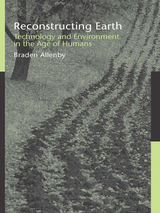
As the world's largest polluter and its wealthiest country, the United States has a potentially enormous impact on international efforts to protect the environment. In this innovative and thought-provoking book, an international group of scholars examines how U.S. foreign policy affects and is affected by global environmental change.
Covering three broad areas—national security and geopolitics, domestic and international politics, and national interests and international obligations—the contributors examine a host of key issues, including ozone depletion and climate change, biodiversity and whale hunting, environmental and energy security, and international trade. They also raise moral issues associated with the United States's obligations to the rest of humanity. Because the environment has become an ever-more pressing issue at the diplomatic level, this book is essential, timely reading for policymakers, activists, and anyone interested in environmental change and international relations.

The Earth's biological, chemical, and physical systems are increasingly shaped by the activities of one species-ours. In our decisions about everything from manufacturing technologies to restaurant menus, the health of the planet has become a product of human choice. Environmentalism, however, has largely failed to adapt to this new reality.
Reconstructing Earth offers seven essays that explore ways of developing a new, more sophisticated approach to the environment that replaces the fantasy of recovering pristine landscapes with a more grounded viewpoint that can foster a better relationship between humans and the planet. Braden Allenby, a lawyer with degrees in both engineering and environmental studies, explains the importance of technological choice, and how that factor is far more significant in shaping our environment (in ways both desirable and not) than environmental controls. Drawing on his varied background and experience in both academia and the corporate world, he describes the emerging field of "earth systems engineering and management," which offers an integrated approach to understanding and managing complex human/natural systems that can serve as a basis for crafting better, more lasting solutions to widespread environmental problems.
Reconstructing Earth not only critiques dysfunctional elements of current environmentalism but establishes a foundation for future environmental management and progress, one built on an understanding of technological evolution and the cultural systems that support modern technologies. Taken together, the essays offer an important means of developing an environmentalism that is robust and realistic enough to address the urgent realities of our planet.
Reconstructing Earth is a thought-provoking new work for anyone concerned with the past or future of environmental thought, including students and teachers of environmental studies, environmental policy, technology policy, technological evolution, or sustainability.
READERS
Browse our collection.
PUBLISHERS
See BiblioVault's publisher services.
STUDENT SERVICES
Files for college accessibility offices.
UChicago Accessibility Resources
home | accessibility | search | about | contact us
BiblioVault ® 2001 - 2024
The University of Chicago Press









